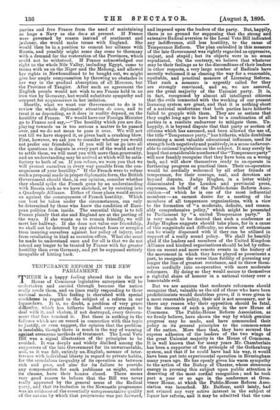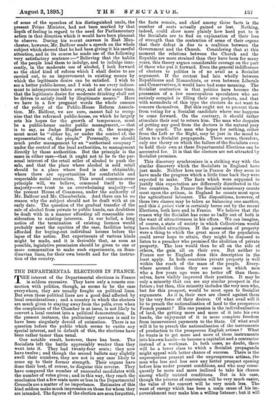TEMPERANCE REFORM IN THE NEW PARLIAMENT. T HERE is a happy
feeling abroad that in the new House of Commons legislative enterprises will be undertaken and carried through because the nation really needs them, and on lines really responding to these national needs. This feeling is cherished with special confidence in regard to the subject of a reform in our liquor-laws. It is, no doubt, a problem of very grave difficulty, which has hitherto baffled every attempt to deal with it, and shaken, if not destroyed, every Govern- ment that has touched it. But there is nothing in the failures which are on record in connection with this topic to justify, or even suggest, the opinion that the problem is insoluble, though there is much in the way of warning against erroneous methods of treatment. The Local Veto Bill was a signal illustration of the principles to be avoided. It was deeply and widely disliked among the supporters of the late Government for its unwarrantable, and, as it was felt, entirely un-English, menace of inter- ference with individual liberty_ in regard to private habits, for the scandalous inequality of its operation as between rich and poor, and also for its failure to provide any compensation for such publicans as might, under its clauses, have their houses closed. There seems very good reason to believe that the Bill was never really approved by the general sense of the Radical party, and that its inclusion in the Newcastle programme was an evidence of the essentially unrepresentative quality of the caucus IT which that programme was put forward, and imposed upon the leaders of the party. But, happily, there is no ground for supposing that the strong and. extensive Radical aversion to the Local Veto Bill indicated any indifference, still less hostility, to the cause of Temperance Reform. The plan embodied in this measure of the late Government was rightly regarded as oppressive, unjust, and stupid ; but its objects were in no sense repudiated. On the contrary, we believe that whatever may be their feelings as to the discomfiture of their leaders in other respects, a very large number of Radicals have secretly welcomed it as clearing the way for a reasonable, equitable, and practical measure of Licensing Reform. That such a measure is urgently called, for they are strongly convinced, and so, we are assured, are the great majority of the Unionist party. It is, in fact, recognised by almost all intelligent citizens that the evils connected with the working of our present licensing system are great, and that it is nothing short of a national misfortune that both parties have hitherto failed to grapple with them. They are so serious that they ought long ago to have led to a combination of all parties in a resolute endeavour to mitigate them. Un- happily, it is beyond dispute that that party or section of citizens which has assumed, and been allowed the use of, the title "Temperance party," has hitherto, while doubtless exercising a. most valuable educational influence, used its strength both negatively and positively, in a sense unfavour- able to rational legislation on the subject. It may surely be hoped that considerable numbers of the " Temperance party" will now frankly recognise that they have been on a wrong tack, and will show themselves ready to co-operate in furthering progress on practical lines. Their co-operation would be cordially welcomed by all other friends of temperance, for their courage, zeal, and devotion are beyond dispute. Judge Hughes, in a letter widely disseminated by the London and provincial press, expresses, on behalf of the Public-house Reform Asso- ciation—of which he is one of the most influential members— an earnest desire for a meeting of the members of all temperance organisations, with a view to the formation of "a moderate, definite, and reason- ably comprehensive policy," which might be presented to Parliament by "a united Temperance party." It is very much to be desired that such a conference as Judge Hughes suggests should take place, for in a cause of this magnitude and difficulty, no stores of enthusiasm can be wisely dispensed with if they can be utilised in support of a really sound policy. We shall be heartily glad if the leaders and members of the -United Kingdom Alliance and kindred organisations should be led by reflec- tion on recent and more remote events in the history of the movement in which they have played so prominent a part, to recognise the worse than futility of pursuing any longer the line of greatest resistance, and to throw them- selves cordially into co-operation with more moderate reformers. By doing so they would secure to themselves a rightful share of honour in a national victory over a lamentable evil.
But we are anxious that moderate reformers should recognise that, valuable as the aid of those who have been prohibitionists would doubtless prove, if it were given to a more reasonable policy, their aid is not necessary, nor is there any reason why their opposition should be fatal, to the success of such a policy in the new House of Commons. The Public-House Reform Association, as we firmly believe, have shown the way by which genuine progress may be made, and have commended their policy in its general principles to the common-sense of the nation. More than that, they have secured the express adhesion of the leaders of the two wings of the great Unionist majority in the House of Commons. It is well known that for many years Mr. Chamberlain has been a supporter of the principle of the Gothenburg system, and that if he could have had his way, it would have been put into experimental operation in Birmingham many years ago. He has openly given his warm sympathy to the action of the Bishop of Chester, whose strenuous energy in pressing this subject upon public attention is deserving of the most cordial recognition ; and he took part a year or so ago in the conference at Gros- venor House, at which the Public-House Reform Asso- ciation was launched. Mr. Balfour, until lately, had not evinced any very active interest in the subject of liquor law reform, and it may be admitted that the tone of some of the speeches of his distinguished uncle, the present Prime Minister, had not been marked by that depth of feeling in regard to the need for Parliamentary action in that direction which it would have been pleasant to observe. During his recent canvass in East Man- chester, however, Mr. Balfour made a speech on the whole subject which showed that be had been giving it his careful attention, and in its course he made use of the following very satisfactory sentence :—" Believing that the habits of the people lead them to indulge, and to indulge inno- cently, in the moderate use of alcohol, I look forward as the chief kind of reform which I shall desire to see carried out, to an improvement in existing means by which the legitimate desire can be satisfied. I wish to see a better public-house, and I wish to see every induce- ment to intemperance taken away, and at the same time, that the legitimate desire for moderate drinking shall not be driven to satisfy itself by illegitimate means." Here we have in a few pregnant words the whole essence of the policy of the Public-House Reform Associa- tion. Mr. Balfour, we are sure, cannot fail to recog- nise that the reformed public-house, on which he largely sets his hopes for the growth of temperance, must be a public-house under public management,— that is to say, as Judge Hughes puts it, the manage- ment must be "either by, or under the control of, the representatives of, the people." Personally, we should much prefer management by an "authorised. company" under the control of the local authorities, to management directly by those authorities. But the principle is the same in either case—that it ought not to be to the per- sonal interest of the retail seller of alcohol to push the sale, and that the place where alcohol is sold retail should be a place where food is also obtainable, where there are opportunities for comfortable and respectable social recreation. This sound common-sense principle will, we believe, commend itself to the majority—we trust to an overwhelming majority—of the present House of Commons, under the authority of Mr. Balfour and Mr. Chamberlain. And there can be no reason why the subject should not be dealt with at an early date. The question of the gradual transfer of the sale of alcohol from private to public hands, can doubtless be dealt with in a manner affording all reasonable con- sideration to existing interests. In our belief, a long notice of the termination of existing licences would probably meet the equities of the case, facilities being afforded for buying-out individual houses before the lapse of the notice. But experiments of various kinds might be made, and it is desirable that, as soon as possible, legislative permission should be given to one or more communities to make such experiments, on Scan- dinavian lines, for their own benefit and for the instruc- tion of the country.



































 Previous page
Previous page